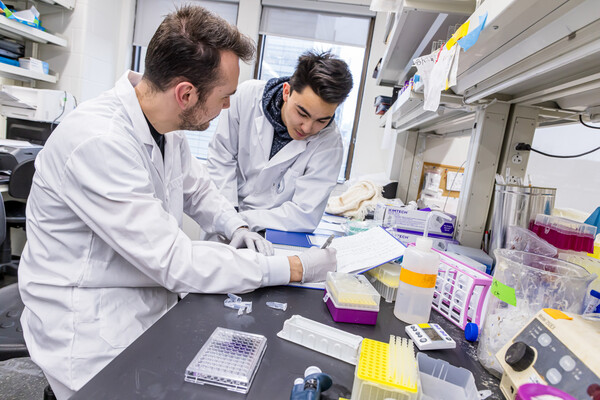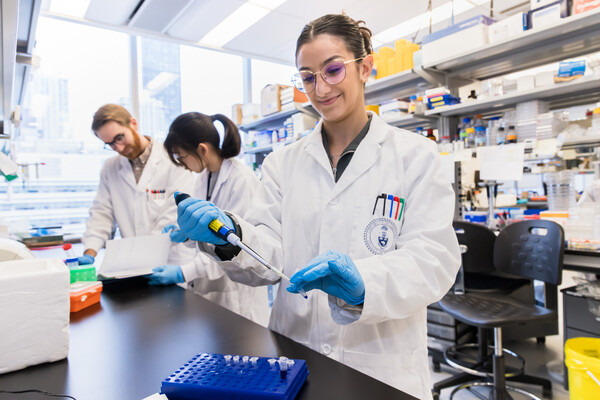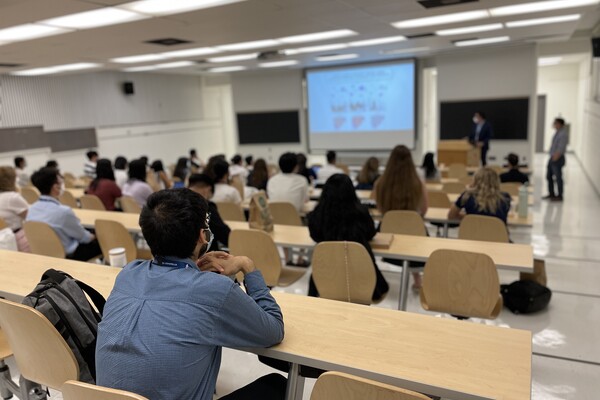Who we are
The Department of Laboratory Medicine and Pathobiology is diverse. Our community is engaged in investigating disease mechanisms and patterns, and translating new knowledge and discoveries into improved health outcomes for patients and populations.
Through basic, clinical, and translational discovery, teaching and clinical training, we educate and mentor the next generation of life science and laboratory medicine critical thinkers.
We are at a unique interface where we can take clinical questions and investigate them at the bench. Our discoveries can be translated into diagnostics and treatments for patients or to advance and challenge current knowledge. This cycle of discovery and translation means that our extraordinary people have a direct and lasting impact on health across multiple fields.
Our mission: what we exist to do
We prepare future leaders in laboratory medicine and pathobiology and improve the health outcomes of individuals and populations through the integration of innovative research, education, and clinical practice.
Our vision: what we work toward
We help societies get healthier by advancing the understanding and diagnosis of disease.
Our values : what we see in our people
We care about improving health for all
We strive for excellence
We collaborate to look at problems in new ways
We bring out the best in people
We are diverse and inclusive
We invest in the wellness of our people
We are agile in our response to emerging ideas and technologies
Our research
We are a diverse department studying disease and its impact on health. We seek to improve diagnostics and treatments to help societies get healthier.
We group our research into the below main areas:
- Artificial Intelligence in healthcare
- Brain and Neuroscience
- Cancer
- Cardiovascular
- Genetics, Genomics and Proteomics
- Hematopathology
- Human development, aging and regenerative medicine
- Infectious diseases and immunopathology
- Metabolism and nutrition
- Molecular and cell biology
What is Laboratory Medicine and Pathobiology?
Laboratory Medicine refers to the branch of medicine in which patient samples are tested to diagnose, treat and prevent disease.
Pathobiology encompasses:
- Pathology: the nature of changes produced by disease.
- Pathogenesis: the mechanisms and changes in disease that occur at the molecular, cellular, and tissue level.
- Pathophysiology: the changes in organ and systems function that accompany disease.
From basic research to clinical care
Our size and diversity are the keys to our success, creating a fertile culture that fosters innovative collaborations for virtually any disease process. We are especially well positioned as a leader across the continuum of discovery research and implementation into practice.
As part of the Temerty Faculty of Medicine at the University of Toronto, we offer unparalleled access to:
- More than 450 expert faculty including basic scientists, laboratory physicians, and scientists
- Outstanding case material
- A stunning array of research opportunities
- Diverse training sites
- Engaging student-run organizations
- One of North America’s largest and most ethnically diverse cities
Breadth and depth of opportunity provides our students with an easily customizable experience. The possibilities are boundless.

Our Specialist Program in Pathobiology, limited at around 35 students per year, teaches the mechanisms of disease. Experiential learning and multiple research opportunities, including our Summer Undergraduate Research experience (SURE), provide an excellent platform for careers in many areas of science and health care.

Our 400+ research active faculty offer MSc and PhD programs in the 100+ research laboratories across Toronto, from the MaRS Discovery District to SickKids. Learn from experts in their fields and be part of a strong student community.

Lead the way in Artificial Intelligence in Healthcare or Translational Research, or explore career development as a Clinical Embryologist or Pathologists' Assistant. Our two-year masters programs give you the tools you need to lead in your career.

From residencies across the spectrum of Laboratory Medicine, to Clinical or Postdoctoral Fellowships and Postgraduate Diplomas, we provide access to world-leading hospitals and experts to develop your training in improving health outcomes.

We provide CPD courses in many areas of Pathology, as well as access to other professional development training designed or led by our expert faculty.

